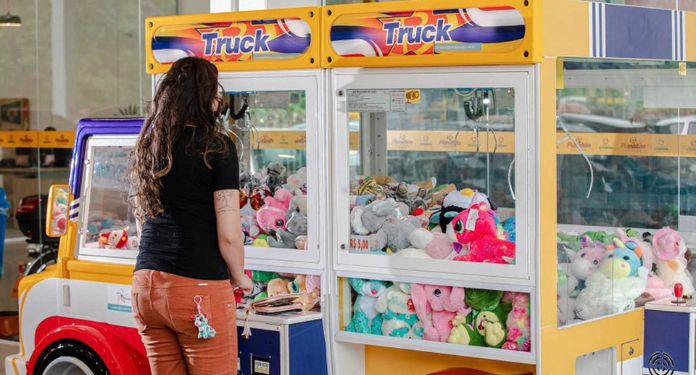Plush machines, also known as “grab claws”, are popular entertainment present in various locations in Brazil, such as shopping malls, supermarkets and even bakeries.
The promise of winning an endearing stuffed animal attracts children and adults alike, but the big question is: are these machines really games of skill or just a matter of luck?
Plush Machine Settings
Signed by Rafael Marchetti Marcondes, an article published on the Lei em Campo website provides good reflections on this topic.
What many don’t know is that the owners of plush machines can have great control over the outcome of the game. Through a configuration panel, they can supposedly adjust several parameters, such as:
- Claw speed: defining how quickly the claw moves, influencing the difficulty of grabbing the prize.
- Play time: limiting the time the player has to try to get the plush, creating a sense of urgency.
- Claw strength: determining the force with which the claw closes, crucial to ensuring the capture of the prize.
- Winning frequency: adjusting the probability of the claw having enough strength to grab the plush, varying every 1 move up to 1 in 50 moves.
Some machines create the illusion of control through specific settings.
The claw may have enough strength in some plays, allowing the player to grab the plush, but in others, the strength is reduced, causing the plush to escape, frustrating the player and encouraging them to keep trying.
The combination of configurable parameters tends to allow machine owners to influence the outcome of the game. This means that, in some cases, the player’s skill loses relevance, as the chance of winning depends mainly on luck.
Lack of specific regulation for plush machines
In Brazil, there is no specific regulation for plush machines.
This means there are no criteria to ensure that the claw has enough strength to capture the plush on every attempt, turning the game into a true test of skill.
Therefore, the false perception of control and the lack of transparency about the chances of winning can lead to behaviors such as:
- Spending excessive amounts of money in unsuccessful attempts to win a prize.
- Develop feelings of frustration, anger and even sadness when losing.
- Getting addicted to gambling, constantly seeking the feeling of reward, even with minimal chances of success.
The need for supervision
The need for inspection and regulation of plush machines in Brazil includes:
- Certification requirement: machines must be certified by qualified laboratories, ensuring that the claw has enough strength to capture the plush in every attempt.
- Transparency: Machine owners must clearly and visibly inform the chances of winning on each play.
- Age limitation: prohibit the use of machines by minors under 18 years of age, protecting them from the risks of gambling.
Plush machines can be fun entertainment, but it is important to be aware that in many cases the outcome of the game does not depend on the player’s skill, but rather on luck.
Therefore, it is essential that there is supervision and regulation to guarantee the transparency of gaming mechanisms and responsible entertainment.




















































